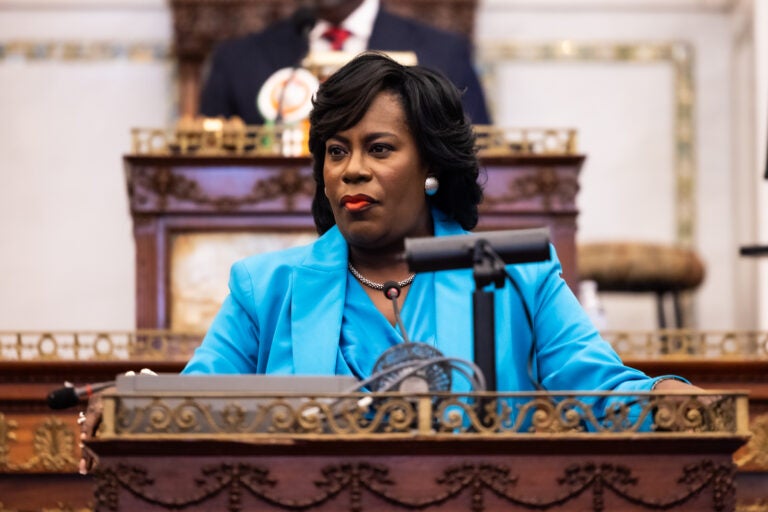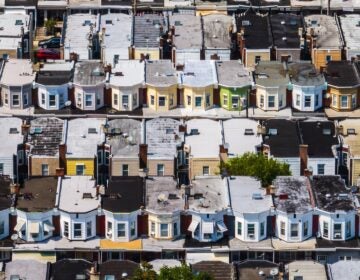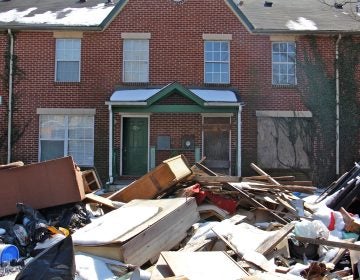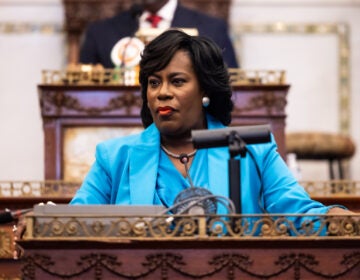To ease Philly’s housing crunch, Mayor Parker wants a tax exemption for developers building affordable rentals
The measure, now moving through Philadelphia City Council, would exclude certain subsidized rental developments.

FILE - Philadelphia Mayor Cherelle Parker delivers her second budget address on March 13, 2025. (Kimberly Paynter/WHYY)
Have a question about Philly’s neighborhoods or the systems that shape them? PlanPhilly reporters want to hear from you! Ask us a question or send us a story idea you think we should cover.
Mayor Cherelle Parker wants certain developments subsidized by the federal government to be exempt from paying Philadelphia’s 1% tax on new residential construction, as part of a broader push to increase the city’s supply of affordable housing amid an ongoing crisis.
A bill moving through City Council would exclude projects backed by low-income housing tax credits, the country’s main mechanism for creating affordable rental housing, from the tax. Typically administered by state housing agencies, the competitive subsidy is used by housing authorities, as well as private and nonprofit developers, to offset the cost of construction.
The legislation is a small part of Parker’s signature housing plan, a $2 billion initiative aimed at creating 30,000 units of housing. The administration wants the majority of those units to be affordable to households earning less than $100,000 a year, and more than 20,000 units are slated to serve families earning around half that amount.
The proposal comes as developers nationwide contend with an assortment of financial hurdles related to construction. That includes an ongoing spike in the cost of building materials, new tariffs on imports and higher interest rates for construction loans.
“There’s obviously the very slim margin for developers who take that chance … to lead the charge in developing affordable housing,” said Jessie Lawrence, director of the city’s Department of Planning and Development. “The last thing we want to do is minimize their ability for a project to pencil out.”
Council passed the development impact tax in 2020 to help fund the Neighborhood Preservation Initiative. The $400 million program, initiated by former Council President Darrell Clarke, was designed to grow the city’s stock of affordable housing, revive commercial corridors, and improve neighborhood infrastructure, among other priorities.
The Building Industry Association of Philadelphia supported the tax at the time, saying the city needed more revenue to grow affordable housing amid a national shortage. The influential group, which advocates for private residential developers, is now backing the exemption on similar grounds.
“My opinion is that it is a supply-suppressing tax,” BIA President Mohamed Rushdy said.
Rushdy, managing partner for the Riverwards Group, added that the bill will be particularly beneficial to small developers, who often have a harder time securing loans for affordable housing projects because their margins are thin. The development impact tax is one of the reasons why, he said.
The General Building Contractors Association, which strongly opposed the tax, did not respond to a request for comment.
The legislation is the latest tied to Parker’s housing plan, dubbed the Housing Opportunities Made Easy, or H.O.M.E., initiative.
Lawmakers in June passed legislation exempting affordable housing projects supported by a city loan or grant. The measure targets homes built through the Turn the Key program, which uses publicly owned parcels to create workforce housing for first-time homebuyers. The land is effectively donated to private developers, who then sell the homes for between $190,000 and $280,000.
Launched in 2022, the Parker administration plans to expand the program under H.O.M.E. to offer more middle-income residents the opportunity to own their homes. The properties are built for households earning up to 100% of the area median income. That translates to $119,400 for a family of four.
By comparison, homes built with low-income housing tax credits are generally affordable to households earning up to 60% of area median income.
Before breaking for summer recess, Council also passed four zoning bills. They seek to lower construction costs in desirable neighborhoods; streamline the approvals process for stacked townhomes; and make it easier to build denser housing in communities that are part of the 5th Council District.
Separately, Council passed legislation designed to reduce the amount of red tape affordable housing developers must get through before construction can start.

Get daily updates from WHYY News!
WHYY is your source for fact-based, in-depth journalism and information. As a nonprofit organization, we rely on financial support from readers like you. Please give today.








